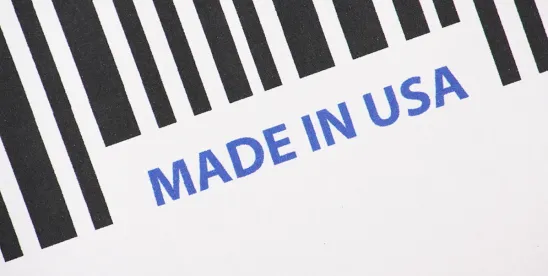The FTC recently updated its “Made in USA” business guidance (see our prior reporting on the agency’s finalizing its “Made in USA” Labeling Rule). The updated business guidance reiterates the longstanding “all or virtually all” standard and explains that companies have an ongoing obligation to review their Made in USA claims in marketing materials, both to comply with the Made in USA Labeling Rule (for claims made on product labels) and with the FTC’s Made in USA Policy Statement (for claims generally). The FTC also applies the “Made in USA” standards to domestic origin statements like “Manufactured in USA,” “Built in USA,” “USA,” “true American quality,” and “Our products are American-made.” The staff provides new examples in the guidance to help businesses understand what kinds of Made in USA claims are covered.
“All or virtually all”
A product advertised or sold in the U.S. must be “all or virtually all” made in the U.S. for a marketer to label or advertise a product as Made in USA. The Labeling Rule applies not only to labels, but also to claims made in online marketing in which labels appear. For a product to be all or virtually all made in the U.S., the product’s final assembly or processing must occur in the U.S., all significant processing that goes into the product must occur in the U.S., and all or virtually all ingredients or components of the product must be made and sourced in the USA. In short, the product should contain no, or negligible, foreign content to be labeled Made in USA.
Companies’ ongoing obligations
Companies have an ongoing obligation to determine whether a Made in USA claim on their product is permissible. To do so, the FTC states manufacturers and marketers should use the cost of goods sold or inventory costs of finished goods in their analysis to determine the percentage of domestic content in the product. However, costs cannot be solely relied on. For some products, the FTC realizes that while only a small portion of the total manufacturing costs are attributed to foreign processing, the foreign processing represents a significant amount of the overall processing for the product. As an example, the FTC cites a company producing watches at a plant in Nevada using U.S. parts and labor with inexpensive Swiss movements; because “movements are essential to the watches’ function,” an unqualified Made in USA claim would not be appropriate.
Further, the FTC cautions manufacturers and marketers from relying on suppliers to provide information about the domestic content in the parts, components, and other elements produced. In the words of the FTC, manufacturers and marketers would be “wise to ask” for specific information from the suppliers prior to making a Made in USA claim.





 />i
/>i
